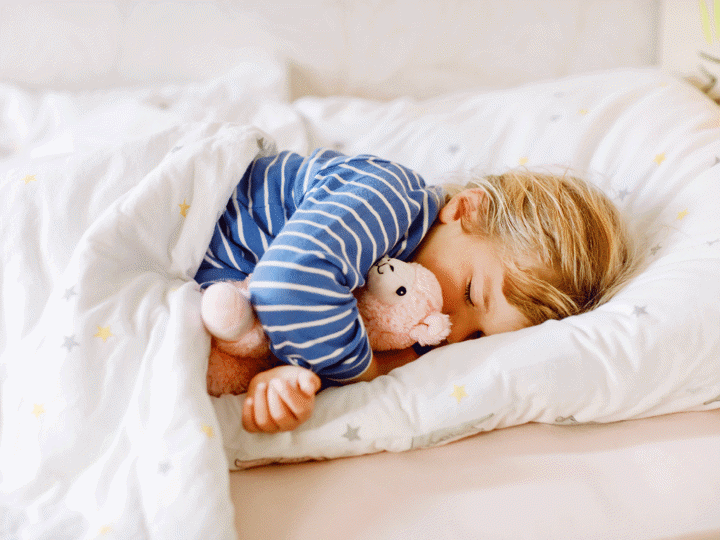Sleep routines for toddlers and children
- 1-5 Years
- 5-11 Years
- Sleep

Establishing a sleep routine
When you have figured out the times your child naturally gets tired you can begin to build a routine around this time. Read our information about how to prepare a sleep routine.
Things that you can do as part of the bedtime routine:
-
- switching off electronics (TV, games console, tablet, or computer) approximately 30 mins to 60 mins before bedtime
- doing a calm activity before bed such as reading, having a bath, or colouring
- brushing your child’s teeth or your child brushing their own teeth
- changing into pyjamas ensuring your child has gone to the toilet before settling down in bed
- going to the toilet before bedtime
If your child still depends on a dummy to fall asleep, they may wake up if they lose it during their sleep. Try to gently switch it for your child's favourite cuddly toy or blanket.

Helping your child wind down for sleep
It can be hard for some children to calm down and get ready for bed, especially if they have had an exciting day.
There are lots of ways you can help your child wind down from their day.
Some ways you can help your child wind down, ready for bed:
- Dim the lights and switch off devices such as the TV, games consoles, computers, and tablets 1 hour before bedtime. The blue light from the screens will keep your child’s brain awake for longer.
- During the hour before bed, encourage quiet offline activities such as reading a book, playing with Lego, or colouring.
- Listening to calm music or white noise can calm some children.
You may also find it helpful to consistently use a ‘bedtime phrase’ such as “night night, I love you” or “I love you, time for sleep now”. These can be used to state that the bedtime routine is over and it is now time to sleep. If you plan to use this, make sure you use it every night.
Remember, every child is different with different needs and preferences. You will know what will calm down and relax your child.

Helping your child sleep through the night
It’s very common for children of all ages to wake up during the night. This is a normal part of your child's development but it can be frustrating for parents.
If your child wakes up during the night and gets out of bed you should:
- Try not to engage in conversations or arguments. Conversations or arguments can wake up your child and delay them from going back to sleep.
- Calmly lead them back to their bedroom. Remind them that it is bedtime and put them back into bed. You may find it useful to make a communication card saying “STOP, return to your bedroom”.
- You will need to repeat this every time they get out of bed.
However, your child may just need a reassuring cuddle before they can go back to bed.
Daytime sleep (naptime) routine
Toddlers and preschoolers require 10 to 14 hours of sleep every day. Naps are a great way to ensure your child is rested and ready to face the day. By having a set routine, your toddler is less likely to resist taking a nap during the day. You will need to figure out the correct balance of naps and sleep for your child and family lifestyle.
If your child is getting too much sleep during the day, it can impact how well they sleep at night. Try to make sure that naps are before 3pm. This will help make sure your child is tired enough when bedtime comes around.
Creating a naptime routine
A naptime routine should be a shorter version of your child's bedtime routine. You can create a naptime routine by using the same steps you have used in your child's bedtime sleep routine.
For example, if you read your child a book as a step in their bedtime routine. Try reading a book as part of their naptime routine.
Make sure you are consistent with bedtimes and naptime. This will teach your child the sequence of events leading up to sleeping and can help them wind down.

Tips to help your child's sleep routine
To reduce the likelihood of outbursts or tantrums around bedtime, there are some things you can do outside of the bedtime routine that can help your child to develop healthy sleep habits and improve their overall quality of sleep.
Avoid caffeine after lunch - Caffeine is a stimulant that prevents sleep. It can cause your child to stay awake for longer and struggle to fall asleep. Caffeine is in energy drinks and fizzy drinks. If your child drinks these, try to limit their intake or avoid them all together after lunchtime.
Avoid eating a large meal before bedtime – This can prevent sleep. You should consider the best time to have a meal, if you are having a large meal, try to ensure that it is eaten over an hour before your child's sleep routine starts.
Encourage your child to only use their bed for sleeping - It can be tempting for your child to take naps or rest in their bed outside of bedtime. This can affect how easily they fall asleep and their quality of sleep. If your child needs to sit and rest, encourage them use something other than their own bed like a chair they find comfy.
Exercise throughout the day, but not just before bedtime - Children can have difficulty falling asleep if they have been inactive throughout the day. Try encouraging your child to take part in sports and play outside. This can help to burn off energy. If your child isn’t very ‘sporty’, a walk in the fresh air or a little dance party can be helpful. However, exercise should be avoided directly before bedtime as this can make it harder for your child to calm down and prevent them from falling asleep.
Wherever your child sleeps or rests, remember to follow safe sleep guidance until they are at least 12 months old. This may be longer for babies born prematurely.
Need more specific support for your child?
If your child needs more help or has additional needs, you can visit our specific section for extra support.
Last reviewed: 1 November, 2023
